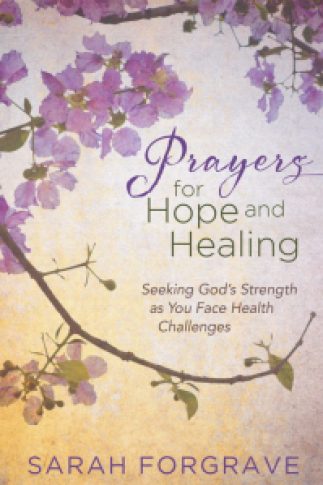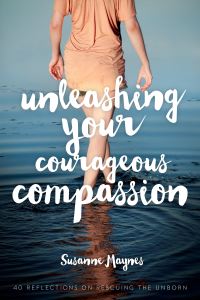How to Pray When You Don’t Know What to Say
“How to Pray When You Don’t Know What to Say” is a blog post by Sarah Forgrave (www.sarahforgrave.com), an introduction to her new book Prayers for Hope and Healing. I read Sarah’s article when she guest posted on Debbie W. Wilson’s Refreshing Faith website.
What caught my attention immediately was Sarah’s reference to her long-time approach to prayer; it was very much like what I’ve written about in my book Brokenness to Beauty, the ACTS in prayer which was so beneficial to me when I discovered it.
Here’s what I wrote in Brokenness to Beauty, Chapter 11 “Prayer: Just Do It … But How?”:
“I distinctly remember when, as a college student, I cried out … in frustration to God. My ‘prayer life’ wasn’t working. I would make my prayer list and start my prayers by asking God this and that for so-and-so, and I meant it wholeheartedly. This would last for a day or two, but time after time my fervor would dwindle into mechanical words read from a list. I knew I had to pray with my heart, but I didn’t know how to maintain the transfer from my head to my heart. I sincerely yearned to communicate with God and effect change through prayer on behalf of others in need, yet I usually ended up feeling that I was falling short. I didn’t know what to do about it, so I did the only thing I did know to do: I asked God to help me.
A few years later I was introduced to a simple way of entering into God’s presence in prayer, one that’s easy to remember and rooted in the Scriptures. It changed the way I prayed and as a result, changed my life. It is called the ACTS of prayer.[i]
The acrostic stands for:
Adoration. Approach God in humility, reverence, and awe, and worship him for who he is. We learn about him as we read and study the Bible. He is holy, and we must approach him as such (Luke 11:2).
Confession. Sin acts as a wall between us and God, effectively blocking our prayers (Isaiah 59:2). We need to be sensitive to God’s Spirit on a daily basis as he speaks conviction to us, confessing and repenting of all known sin as soon as we are aware of it. That way, communication with God remains open (1 John 1:8–9).
Thanksgiving. The greatest acceptable sacrifice we can make to God (along with laying our lives at his feet as a living sacrifice, as Paul tells us to do in Romans 12:1) is the sacrifice of thanksgiving and praise (Hebrews 13:15). Our prayers are to be seasoned with gratitude.
Supplication. This is the part we normally think of as prayer: asking God for something (Luke 11:9–10). Our requests must be couched in the reverence and worship due to God as we seek first his will in the matter, with our prayer purged of known sin through confession and repentance, wrapped in trust, and infused with thanksgiving.”
As I wrote, “It changed the way I prayed and as a result, changed my life.” It became the pattern for most of my prayers. When I read Sarah’s article, it seemed she used a similar way of praying.
But I also wrote in Brokenness to Beauty, “There are, of course, times when all we can do is burst out, ‘Lord help me!'” There are times when we are so burdened and feel so deeply our need, we cry out like the psalmists did, in the agony of our heart. We still approach God in humility and reverence, but we burst into his presence in the agony of our situation.
I think this is what Sarah found as well when she experienced tremendous physical struggles coping with a chronic disease, and she found prayer too was a struggle. Her method of approaching God felt insufficient in her time of need.
I understand fully, having lived with a chronic disease for over 50 years and having faced the trauma of breast cancer and treatment, and then the fractures of both my femurs, rods surgically implanted in them, and months of physical therapy. Life gets hard at times and what is familiar can seem inadequate for the present struggle.
That’s why I want to share Sarah’s blog post with you and introduce you to her book, Prayers for Hope and Healing. If you are struggling right now, or know someone who is, and prayer seems just as hard, the old familiar patterns inadequate, this article and Sarah’s book may be just what you need.

From the back cover of Prayers for Hope and Healing:
Amid Pain and Weakness…There is HOPE
Serious or chronic medical issues bring a litany of painful and confusing feelings that only someone else who’s been in a similar situation could possibly understand. Sarah Forgrave has walked the difficult road you find yourself on. And she empathizes with the uncertain future you face.
No matter the road ahead, you don’t have to face it alone. Even in the depths of your worst emotional and physical pain, God is right there beside you, offering His comfort, love, and peace.
As you read these heartfelt prayers and devotions, let this book be your manual to help navigate the difficult set of emotions that come with health issues. Read it front to back or go directly to the devotion addressing how you feel at any given moment…when you need it the most.
Above all, know that you are never, ever alone.
Read Sarah’s blog post as she shares “How to Pray When You Don’t Know What to Say”:
For most of my life, I approached prayer like a checklist. It went something like this. Adore God. Confess my sins. Thank Him for His forgiveness. Ask Him for what I want.
This checklist helped fill the awkward silence, but when life got hard, so did prayer.
Suddenly my adoration wasn’t so quick to rise to the surface. Instead of confession and gratitude, I was mad at God for letting me hurt. There were plenty of things I wanted Him to do, but I frankly didn’t have much faith He would follow through on them.
Have you found yourself in the same place?
To continue to read how Sarah learned to connect with God during hard times, you can see the full article here: https://debbiewwilson.com/how-to-pray/
Bio:
Sarah Forgrave is an author and wellness coach who loves inspiring others toward their full potential. In addition to her book, Prayers for Hope and Healing (Harvest House, October 2017), her writing credits include contributions to The Gift of Friendship, Guideposts’ A Cup of Christmas Cheer, and the webzine Ungrind. When she’s not writing or teaching, she loves to shop at Trader Joe’s or spend time with her husband and two children in their Midwest home. Visit Sarah at www.sarahforgrave.com, or at the following sites:
Facebook: www.facebook.com/AuthorSarahForgrave
Pinterest: www.pinterest.com/SarahForgrave
Instagram: www.instagram.com/SarahForgrave_Author
Twitter: www.twitter.com/SarahForgrave
[i] The ACTS of Prayer are explained at
http://prayercentral.net/engage-me/ways-to-pray/pray-with-acts
Pursuing Life with Courageous Compassion
Several months ago I had the privilege of reading and reviewing Susanne Maynes’ first book, Unleashing Your Courageous Compassion: 40 Reflections on Rescuing the Unborn. You can read my review on Amazon. I was so impressed with Susanne’s devotional book that I bought copies to give to friends.
Susanne Maynes has the credentials for writing such a book. She has been involved in life-affirming ministry for ten years, is the Counseling Director at Life Choices Clinic, a pregnancy resource center in Lewiston, Idaho, and is certified as a Biblical Counselor by the Board of Christian Professional and Pastoral Counselors. She has been married to Scott for 34 years, and they have three married sons and four delightful grandchildren (so far). Susanne blogs about church and culture, spiritual growth, and Christian parenting at susannemaynes.com, and regularly guest posts for Heartbeat International’s pregnancyhelpnews.com.
This interview is about her book, Unleashing Your Courageous Compassion: 40 Reflections on Rescuing the Unborn.
- What prompted you to start writing Unleashing Your Courageous Compassion?
Entering the world of pregnancy resource center ministry was eye-opening and life-changing for me. Although I considered myself pro-life, I was the sheltered church lady who didn’t have a clue about the issues surrounding most unplanned pregnancies. As my passion for this ministry grew, I began writing poems based on my conversations and interactions at the clinic.
A few years ago, my husband came home from a Great Turnaround training event with Dr. Bruce Wilkinson. As Scott described how Bruce had asked the group, “What does God want done?” I heard the Holy Spirit say to me, “Forty poems.”
I assembled the poems I was writing, along with some I’d already published, and wrote daily devotionals to go with them to create a 40-day journey toward pro-life ministry.
- They say an author should write their book for an audience of one. Who was the “audience” that inspired you to write this book?
One day years ago, a lady came to the clinic in hopes of volunteering with us. Each time I explained an area of ministry where she could help, her response was, “Oh, I don’t think I could do that.”
I could see that she had much to offer young people facing unplanned pregnancies, yet her fears prevented her from ministering. She never did join our team. I want to encourage others who’ve let intimidation hold them back. The field is white and the laborers few!
- Other books exist which explain the pro-life mission and invite people to join the cause. What makes this book unique?
I greatly appreciate, and have quoted, authors like Randy Alcorn (Why Prolife) and John Ensor (Answering the Call). Their material has been a great help to me. John gave me some personal tips for my manuscript, for which I am extremely grateful.
What makes my book unique is its format as an educational devotional. Each day’s poem serves as a word picture engaging the right side of the brain. Next comes the day’s reading, including relevant statistics and facts, and then a related Scripture verse. Last, there’s a journaling prompt so readers can process what they’ve read that day.
In this way, I take you, the reader, inside the four walls of a pregnancy enter so you can experience how this ministry works, how vital it is, and what it would look like to participate.
- In what ways is pregnancy center ministry a non-threatening yet highly effective way to do pro-life work?
Pregnancy center work is a great way to change our culture one conversation at a time. We tend to stay out of the political arena. There’s no need to hold up signs or be publically confrontational.
Offering compassion, hope and help during a pregnancy decision process is a very effective way to save lives and share the gospel, because lives change when people know you care.
- In what ways is pregnancy center ministry more challenging than other parachurch ministries?
We are very careful with confidentiality. The folks we serve are not proud of the fact that they are considering abortion (or have had one). It’s difficult to find those who are willing to let their stories be told.
Additionally, many whom we serve live in poverty and deal with other issues besides unplanned pregnancies. That means their lives aren’t necessarily made “all better” when they make a decision for life for their child.
This can be difficult for our supporters to understand, because they love to see a live baby at fundraising events, and hear a dramatic story of turnaround. Those kinds of live testimonies can be few and far between.
- You’ve been doing this ministry for ten years. What inspires you to keep going?
I love partnering with God in bringing the good news of the gospel into people’s lives. At the clinic, I’ve had far more opportunities than ever before to talk about Jesus, introduce people to him, pray for them, and ask them good questions to help them grow in their knowledge of God.
I’ve been richly blessed to participate in helping save the lives of people who may otherwise have died in the womb. I’ve experienced exponential growth in my understanding of culture and how to encourage people toward faith in Christ. I get to reflect both God’s justice and his mercy.
All this, and there’s an eternal reward coming as well!
- Any final encouraging words?
If I can do this, you can, too. There are women and men who need you to come alongside them. There are pre-born children whom you could help rescue from abortion. Maybe God has poured more into you than you realize. Maybe he’s prepared you for this ministry for such a time as this.
I hope and pray you’ll go on this 40-day journey to find out.
Unleashing Your Courageous Compassion: 40 Reflections on Rescuing the Unborn is available on Amazon.

